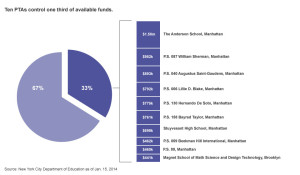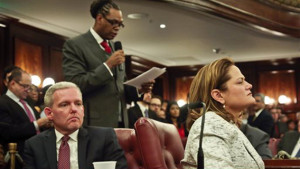By now, you probably know which candidate you’ll be voting in Tuesday’s mayoral election. But do you know where your chosen candidate’s big ideas actually come from? Some sources are ones you expect: Bill de Blasio brings much from unions and liberal movements, while many of Joe Lhota’s ideas stem from the Giuliani administration. Still, a closer look at their agendas reveals some surprising origins.

AP Photo/Wall Street Journal, Peter Foley
LHOTA: Return the Hotel Tax to 5%

This one’s a throwback to the Giuliani era. In 1990, after the state imposed a hotel occupancy tax on top of city taxes, charges on the city’s hotel rooms rose to 21.25 percent, the highest in the nation, leading to an unofficial boycott by meeting and convention planners. In a move still praised by conservatives as a sign that the city was changing its relationship with the business community, Mayor Rudolph Giuliani cut the city’s portion of the hotel tax from 6 to 5 percent in 1994. The Giuliani administration used a subsequent surge in tourism and hotel tax revenue as evidence that the tax reduction worked and used it to make a case for other tax cuts. A 1997 Independent Budget Office study found that while the tax cut “did generate significant increases in economic activity and tax revenues, the tax cut did not pay for itself.” In 2008, Mayor Michael Bloomberg successfully persuaded the City Council to increase the hotel tax to 5.875 percent, which part of an effort to fill a $4 billion budget shortfall.
DE BLASIO: Charge Charter Schools Rent
 The idea of charging charter schools rent, perhaps de Blasio’s most controversial education position, was born out of 2011 report by the city’s Independent Budget Office.The IBO found that charter schools in district-owned space effectively received $2,358 more per student than charter schools that pay for private space. Based on that report, a group of some of the city’s most outspoken education activists, including Leonie Haimson of Class Size Matters and Mona Davids of NYC Parents Union, sued for more than $100 million in back rent, a figure derived from the $2,358 per student amount. The legal basis of the suit was a section of New York State law that says a charter school “may” contract with a district for the use of a school building but services “shall” be provided to the charters at cost. A judge dismissed the suit in April.
The idea of charging charter schools rent, perhaps de Blasio’s most controversial education position, was born out of 2011 report by the city’s Independent Budget Office.The IBO found that charter schools in district-owned space effectively received $2,358 more per student than charter schools that pay for private space. Based on that report, a group of some of the city’s most outspoken education activists, including Leonie Haimson of Class Size Matters and Mona Davids of NYC Parents Union, sued for more than $100 million in back rent, a figure derived from the $2,358 per student amount. The legal basis of the suit was a section of New York State law that says a charter school “may” contract with a district for the use of a school building but services “shall” be provided to the charters at cost. A judge dismissed the suit in April.
LHOTA: Increase the Number of Intersections Where Drivers Can Take a Right Turn on Red
 This origins of this one comes from efforts to reduce energy consumption following the 1970s oil crises. Lhota, drawing from experience as the head of the Metropolitan Transportation Authority, is proposing increasing the number of intersections where motorists can to take a right turn on a red light. In 1975, President Gerald Ford signed the Energy Policy and Conservation Act into law, which used federal assistance to get the states to develop an energy conservation plan. Increasing the number of states that allowed rights on red was among the federal goals. By 1980, all states, including New York, had. But the state’s law is written to give New York City an out: “Turning right on red is prohibited in cities with a population of more than one million unless a sign permits it.”
This origins of this one comes from efforts to reduce energy consumption following the 1970s oil crises. Lhota, drawing from experience as the head of the Metropolitan Transportation Authority, is proposing increasing the number of intersections where motorists can to take a right turn on a red light. In 1975, President Gerald Ford signed the Energy Policy and Conservation Act into law, which used federal assistance to get the states to develop an energy conservation plan. Increasing the number of states that allowed rights on red was among the federal goals. By 1980, all states, including New York, had. But the state’s law is written to give New York City an out: “Turning right on red is prohibited in cities with a population of more than one million unless a sign permits it.”
DE BLASIO: Build the Neighborhood Parks Alliance
 This one comes from State Senator Dan Squadron’s desk. The state senator in June proposed that richer, better funded green spaces, such as Manhattan’s Central Park, share some of their wealth with parks in need. The Neighborhood Parks Alliance is supposed to “ensure more equity across the city’s 1,700 parks,” according to Squadron’s proposal. Under Squadron’s plan, a contributing park would commit 20 percent of its conservancy’s budget to member parks in need. “Large conservancies get millions a year from private donors. But the parks that find it hardest to get that support are the ones that need it most,” Squadron said when he announced the bill. Much of the funding for individual parks is dependent on council members’ individual earmarks, rather than the Department of Parks and Recreation budget. While some parks are supported by private funds from conservancies or official organizations, many are not and badly need extra cash. With that in mind, de Blasio has expressed support for the plan saying that he wants to spread the wealth among the parks, even though it has some parks advocates worried.
This one comes from State Senator Dan Squadron’s desk. The state senator in June proposed that richer, better funded green spaces, such as Manhattan’s Central Park, share some of their wealth with parks in need. The Neighborhood Parks Alliance is supposed to “ensure more equity across the city’s 1,700 parks,” according to Squadron’s proposal. Under Squadron’s plan, a contributing park would commit 20 percent of its conservancy’s budget to member parks in need. “Large conservancies get millions a year from private donors. But the parks that find it hardest to get that support are the ones that need it most,” Squadron said when he announced the bill. Much of the funding for individual parks is dependent on council members’ individual earmarks, rather than the Department of Parks and Recreation budget. While some parks are supported by private funds from conservancies or official organizations, many are not and badly need extra cash. With that in mind, de Blasio has expressed support for the plan saying that he wants to spread the wealth among the parks, even though it has some parks advocates worried.
DE BLASIO: Raise the Minimum Wage
 This one’s big with organized labor. The Service Employees International Union and its local affiliates, the local SEIU affiliate backed de Blasio in the primaries and the general election, have organized efforts across the country to raise the minimum wage. Their recent efforts include backing walkouts of fast food workers over pay and the right to unionize and local ballot measures to increase the minimum wage. On November 5, in addition to de Blasio’s race, SEIU will be looking to Seatac, Washington, where Proposition 1 proposes increasing the minimum wage to $15 in the small city that grew up around Seattle-Tacoma International Airport. Labor has been successful in getting minimum wage hikes through in large cities like Boston, San Francisco and Albuquerque.
This one’s big with organized labor. The Service Employees International Union and its local affiliates, the local SEIU affiliate backed de Blasio in the primaries and the general election, have organized efforts across the country to raise the minimum wage. Their recent efforts include backing walkouts of fast food workers over pay and the right to unionize and local ballot measures to increase the minimum wage. On November 5, in addition to de Blasio’s race, SEIU will be looking to Seatac, Washington, where Proposition 1 proposes increasing the minimum wage to $15 in the small city that grew up around Seattle-Tacoma International Airport. Labor has been successful in getting minimum wage hikes through in large cities like Boston, San Francisco and Albuquerque.
LHOTA: Close Failing Schools

While this idea is often connected to federal edicts like President George W. Bush’s No Child Left Behind or President Barack Obama’s School Improvement Grants, the concept of shuttering failing schools was born locally under Governor Mario Cuomo in 1989, well before the federal government decided to step in to close the achievement gap. In 1989, New York State began complying a “SURR” list, schools under registration review. While the state gave schools time to clean up their acts — too much time according to the conservative Manhattan Institute — the ultimate penalty was to close the school. This idea continues to enjoy support on both sides of the political aisle, including Democrat Governor Andrew Cuomo, former Obama aide and current Chicago Mayor Rahm Emanuel and Republican Louisiana Governor Bobby Jindal.
LHOTA: Let’s Stick With Compstat

Compstat, a reporting system that compiles real-time statistics on crime, was first introduced during the Giuliani administration in 1994. Jack Maple, a transit police officer who later became deputy police commissioner, together with then-police commissioner Bill Bratton, introduced the system first in the transit police department and later to the NYPD. Compstat aimed to reduce crime and improve quality of life in the city’s neighborhoods. The program, which has been introduced to other major American cities since its origin, has seen some criticism from skeptics who say that the system doesn’t account for inaccuracies in the data and can be manipulated to make it seem as if crime has gone down in specific precincts. Lhota, who has said he had a role in rolling out Compstat in the 1990s, has vowed to keep the program as a main way of tracking crime in the city.
DE BLASIO: Reopen the East 91st Street Marine Transfer Station
 De Blasio shares the Bloomberg administration’s commitment to reopen Manhattan’s waste transfer station on the East River, first built in the 1930s to accommodate New York City’s growing population and closed by the Giuliani administration (under Joe Lhota’s watch). That’s no accident: when he served on the City Council, de Blasio was a supporter of the 2004 citywide waste management plan, which assigned each borough to handle household residential garbage at its own facilities. The idea of having Manhattan once again manage its own trash was advanced by neighborhood environmental justice groups, which called attention to the proliferation of waste transfer stations and trucks in low-income neighborhoods in the outer boroughs. De Blasio takes matters a step further and also supports a “zero waste city,” which will include outlawing styrofoam as well as decreasing the use of plastic bags.
De Blasio shares the Bloomberg administration’s commitment to reopen Manhattan’s waste transfer station on the East River, first built in the 1930s to accommodate New York City’s growing population and closed by the Giuliani administration (under Joe Lhota’s watch). That’s no accident: when he served on the City Council, de Blasio was a supporter of the 2004 citywide waste management plan, which assigned each borough to handle household residential garbage at its own facilities. The idea of having Manhattan once again manage its own trash was advanced by neighborhood environmental justice groups, which called attention to the proliferation of waste transfer stations and trucks in low-income neighborhoods in the outer boroughs. De Blasio takes matters a step further and also supports a “zero waste city,” which will include outlawing styrofoam as well as decreasing the use of plastic bags.









